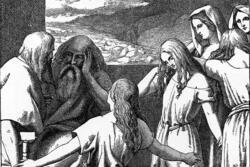Near(ly) a Woman
Every year in the Hebrew month of Shevat, Jews around the world read Parshat Yitro, the Torah portion that contains the Ten Commandments. But the “Big Ten” are only part of this portion – Parshat Yitro also contains a visit from Moses’ father-in-law, a feast, and a set of instructions from G-d transferred with questionable integrity by Moses to the Israelites. Before becoming a Bat Mitzvah at age 12, I spent months studying this portion and its various commentaries. One line was particularly alarming to me: “Be ready for the third day: do not go near a woman.”
This verse comes from a set of instructions about how the Israelites are to act in order to remain pure for the three days before they receive the Ten Commandments. While the language of the Torah can almost always be interpreted in multiple ways, there is a rare level of agreement between commentators that Moses’ decree introduces the idea that sexual relations with a woman make a man impure (we can assume he only refers to the men in the group, as neither the Torah nor its commentaries mention lesbianism in regard to this verse).
This line has long disturbed men and women alike; not only does it raise questions of Moses’ perception of female impurity, but it also wasn’t part of what G-d had told Moses to say. Therefore, this instruction came exclusively from Moses himself.
To the surprise of everyone who knew me then, 12-year-old me flat-out refused to discuss this line in my Dvar Torah. I wasn’t ready. Maybe I was a month away from becoming an adult in the Jewish spiritual sense, but I had a long way to go before truly becoming a woman. How, then, was I going to take on this verse that so directly targets female sexuality?
So here I am now, a month away from becoming an adult in a different community – the American legal one – finally beginning to face this troubling verse.
Surprisingly, several commentaries on this line say that its purpose is to protect women from impurity, not men. It’s interesting to consider that this line might’ve been written in the interest of protecting women – but I don’t buy it. The fact that Moses addresses the people Israel as a whole (both women and men) with a statement that only acknowledges men, tells me that Moses probably wasn’t thinking about the women in the group.
In that case, we’re back to the supposed impurity of relations with a woman. Does this mean that I should apologize for having a crush on a boy in my class? Should I be ashamed that I might potentially be sexually attractive to a boy or man? When I look at the dress code for my public high school, and realize that this three-page handbook is telling me that I should be covering up my body for the sake of the young men in my classes – does my religion support this?
Modesty is part of traditional Judaism, especially for women, although movements such as Reform Judaism have taken less strict stances on these guidelines. However, my understanding of the Jewish woman’s reason for dressing modestly was never about shame, but rather about respecting the body. But this example of a high school dress code professes a need to reduce so-called distractions; while the boys’ dress code prohibits mainly gang-related clothing, the code states that girls, “shall not wear sexually suggestive or revealing clothing.” The potential for boys’ sexual attraction to girls in shorts having an impact on their education is therefore the high school equivalent of men’s sexual relations with women being detrimental to their ability to pray. Double standards in dress codes are the feminist battle of girls as double standards in sex-positivity are the battle of women.
When I was studying for my Bat Mitzvah, I was a child on the verge of adulthood. Now, I am a girl on the verge of womanhood. What’s the difference? The difference, I think, is an identity which we choose to take on and which we work hard to become. For me at least, it's like when Peter Parker gets the Spiderman suit in “Spiderman: Homecoming.” He's still a kid with a rough backstory and a “trying-to-be-cool” nerdy best friend, but over time he becomes Spiderman himself. It doesn't happen immediately, though – there's an awkward period of trying to master his powers and limitations, during which it would be fair to say he's on the verge of superhero-hood. Likewise, newly-Bat Mitzvah me was still learning the powers and limitations of womanhood. I still am, though I’ve learned a lot since then.
I still don’t know how to reconcile Moses’ objectifying and frankly uncomfortable contribution to Parshat Yitro with my identity as a young Jewish woman studying Torah in the 21st century, but I’m okay with that. The search for rationale in this story is part of the journey to Jewish womanhood – a journey that I started when I was 12, and which will only continue and deepen as I get older.
This piece was written as part of JWA’s Rising Voices Fellowship.








And such a beautiful picture!!
This is great, Tamar! Keep up the good work!